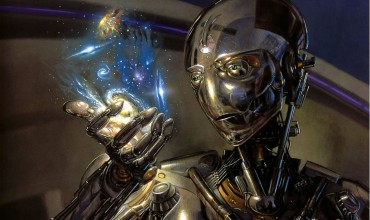Elizabeth Moon on Vatta’s War
The Vatta’s War series of science fiction describe space warfare in more detail and with more realism than anything else I’ve read, played, or watched. Yes, I know these are big words, but Elizabeth’s attention to detail on both the macro and micro scale is unique in my experience, and definitely breaks the mold for space combat realism . From crew interaction to launch tube maintenance to command & control to the challenges of multiship combat formations, she’s covered it all and a lot more.
I’ve read a lot of sci-fi so I was curious about how Mrs. Moon was able to put this much detail and imagination into her books. I found out on her website that she’s done a lot of cool stuff in her life (ex-military, multiple college degress, EMS experience, just to scratch the surface), which made me even more interested, hence contacting her for an interview. She was awesome enough to respond (and with answers, no less), so here they are!
The Interview
Q: I see from your bio that you served in the US Marine Corps, and many of your characters have a military background. Does your service background assist your writing?
A: Absolutely. My experience in the military has been essential to writing military SF and the military side of epic fantasy. In addition to my own experience, I’ve had access to others–my husband is an Army veteran and served a tour in Vietnam. Growing up, I was among WWII and Korean War vets, including Army nurses, Seabees, Army Engineers, and so on. Although they didn’t talk to children about their combat experience (we did sneak up close to windows and doors to listen sometimes) they did talk about supply issues, construction, and odd incidents they thought OK for kids to hear. But ultimately, it was my own experiences that gave me what I needed–including how to understand theirs.
Writers an learn a lot about military operations, military history, military “tech” without actually being in the the service, and many of them get the book-knowledge right– but the human side, the psychology of it, the way that the different grades and ranks interact, is very hard to get right without having been there. Not saying it’s impossible, just that this is where most have trouble.
Q:The macro scale multi-ship engagements in the Vatta’s War series are the most descriptive I’ve ever read (and I’ve read a lot of sci-fi!): I was reminded of an engagement from the new Battlestar Galactica series x100! This definitely didn’t come at the cost of ignoring the micro scale however, as there was also a lot of detail on single-ship operations in the series. Can you talk a bit about your thought process while writing such detail and how you achieve it?
A: It began with considering how different classes of ships could move in 4-D (time plus 3 spatial dimensions), given some basic constraints. My mother was an engineer–during WWII, she worked as liaison engineer for the Army Air Corps at a Douglas plant outside Chicago–and I absorbed a lot about how aircraft, buildings, and other things go from an idea to reality.
But military operations are not just about the ships/tanks/aircraft: also involved are communications (vital for command & control, and a weak spot for security–both sides), supply, the overall organization of the force, etc. Lots of etc. In brief, operations are constrained by the capabilities of the people and the technology. So: ships have a defined size, a defined cargo capacity, structural limitations on the stresses they can handle, etc. Crew size and qualifications; communications limitations and weaknesses (especially when combining different forces into one: I have experienced non-matching radio frequencies in EMS); supply of vital materials; and more and more. Thus I have lots of notes to myself, on all this stuff plus continuity (did a ship take damage in a previous book? It can’t just reappear all bright shiny new in the next unless that’s accounted for.)
Finally, with the background determined, planning the engagements can begin. That starts with sketches on paper, with blobs for opposing forces–establishing the axis of that solar system and any relevant planets, moons, space stations. Then it moves on to more elaborate diagrams with scribbled notes (how many of this class or that class of ship.) At times, this has involved family and friends waving around various unship-like objects (knives and forks, plates and mugs) designated as cruisers, escorts, transports, whatever, while I look at angles and imagine the communications lags. Every engagement has its own “arc”–as well as its own effect on the long story arc–so everything has to happen in the right order…”naturally.” A certain amount of randomness has to be allowed, even in an engagement pivotal to the whole series…when in doubt, make it worse. Then I write it in segments, often from both sides, “playing” both my protagonist and the opposition commander. It usually comes out boring at that stage, too detailed and “flat” like the worst history books. And finally, putting on the best music I can for the purpose, I rewrite the whole thing in one long session, so it flows. For the big battle in Victory Conditions, that was Bach’s “Magnificat” and Vivaldi’s “Gloria” (The music needs to be structurally complex, long enough and short enough both. For battles, it helps to have two pieces, not one longer one.)
Q: I assume you read, watch, and/or play sci-fi. Can you list a few favorites?
A: It’s the “a few” part that’s hard…I’ve been reading SF since I was 15 and that’s a lot of decades ago. I don’t re-read the very early favorites that often now (time, as much as “outgrowing” them, though that happened too. The humor that had a 15 year old laughing out loud in the school library doesn’t work as well for someone my age.)
Q: Do you ever make it out to any conventions for book signings?
A: Yes, though not as many as I used to. But this year I’ll be at Keycon in Winnipeg in May, Soonercon in Oklahoma in June, DragonCon in Atlanta over Labor Day, and possibly ArmadilloCon in Austin in early August depending on family member’s surgery date and recovery. Missed it last year because of my eye surgery, drat it.
Q: I finished the Vatta’s War series a few months ago, and have started on your other works. Can your fans expect anything new from you in the near future?
A: I’m working on another Vatta-related book right now; it will likely be out sometime in 2016. A print edition of Deeds of Honor, my first indie e-book, a collection of short fiction relating to the epic fantasy series, will be out soon, and and there may be another Paksworld short-fiction collection out as an indie e-book in the fall/winter of 2015, though that schedule’s not nailed down yet.
Q: Any recommendations for aspiring sci-fi authors?
A: I have some essays [on the subject] up on my website here
But in brief: Read a lot–many different kinds of things, not just SF. Write a lot–many different kinds of things (nonfiction, other genres of fiction, poetry.) Stay interested in people–observe them, listen to them–because characters and their motivations are the real story-drivers.
Many thanks to Elizabeth Moon for taking to time to answer my questions for this interview. I can’t recommend her works enough, especially Vatta’s War, which is now one of my favorite sci-fi series!

Like FoH?
Fists of Heaven is ad-free and always will be. If you enjoyed the content above, help us out by sharing this post, or by commenting and letting us know what content you like and want to see more of. Thanks for reading!




